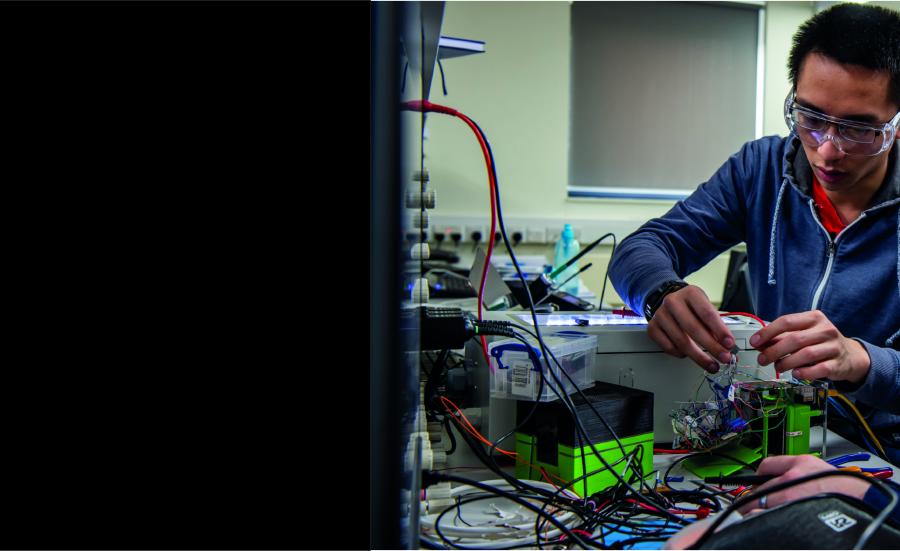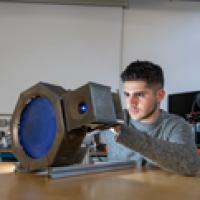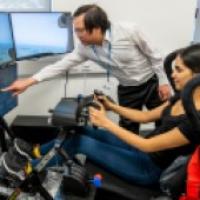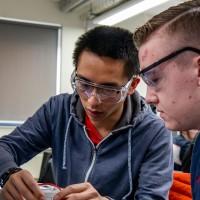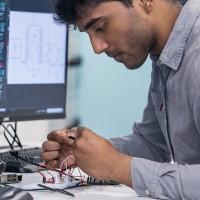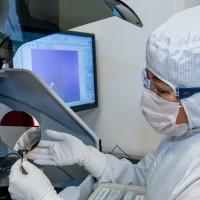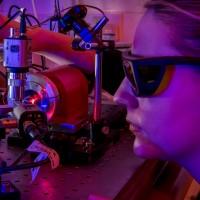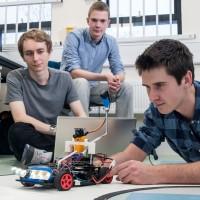About this course
This degree will teach you to design new technologies and solve some of today’s biggest engineering challenges. You'll look into subjects like smarter energy distribution and intelligent robotics. Learn from researchers who will share their passion for their areas of expertise. This includes high-voltage electrical engineering, sustainable energy and machine learning.
Electronics is all about the components and systems that make electronic devices work. Electrical engineering deals with the generation, distribution and use of electricity on a large scale. This degree combines our exceptional training in both disciplines.
During your studies, you’ll have access to outstanding experimental research facilities. This includes a modern electronics lab with the latest industry-standard equipment.
You’ll carry out experimental and design-based assignments. You could build a robot or design and testing a microprocessor. You’ll also learn the programming and mathematical skills in your engineering training. For example, you might choose to use simulation software to design and analyse electronic control systems.
You can also learn about the latest advances in areas such as quantum technology and photonics (the science of light).
This BEng Electrical and Electronic Engineering degree is accredited by the Institution of Engineering and Technology on behalf of the Engineering Council for the purposes of:
-
fully meeting the academic requirement for registration as an Incorporated Engineer
-
partly meeting the academic requirement for registration as a Chartered Engineer
Accreditations
Course location
This course is based at Highfield.
Awarding body
This qualification is awarded by the University of Southampton.
Download the Course Description Document
The Course Description Document details your course overview, your course structure and how your course is taught and assessed.
Changes due to COVID-19
Although the COVID-19 situation is improving, any future restrictions could mean we might have to change the way parts of our teaching and learning take place in 2021 to 2022. We're working hard to plan for a number of possible scenarios. This means that some of the information on this course page may be subject to change.
Find out more on our COVID advice page.
Entry requirements
For Academic year 202223
A-levels
AAA including mathematics and an additional required subject
or
A*AB including grades A*A in mathematics and an additional required subject (in any order)
A-levels additional information
Required A-level subjects include mathematics and either physics, further mathematics, electronics or computer science. Offers typically exclude General Studies and Critical Thinking. A pass in the science Practical is required where applicable.
A-levels with Extended Project Qualification
If you are taking an EPQ in addition to 3 A levels, you will receive the following offer in addition to the standard A level offer:
AAB including mathematics (minimum grade A) and an additional required subject (minimum grade A), plus grade A in the EPQ
A-levels contextual offer
We are committed to ensuring that all applicants with the potential to succeed, regardless of their background, are encouraged to apply to study with us. The additional information gained through contextual data allows us to recognise an applicant's potential to succeed in the context of their background and experience.
Applicants who are highlighted in this way will be made an offer which is lower than the typical offer for that programme, as follows:
AAB including mathematics (minimum grade A) and an additional required subject (minimum grade A)
International Baccalaureate Diploma
Pass, with 36 points overall with 18 points required at Higher Level including 6 at Higher Level in Mathematics (Analysis and Approaches) or 7 at Higher Level in Mathematics (Applications and Interpretation), and 6 at Higher Level in an additional required subject
International Baccalaureate Diploma additional information
Required Higher Level subjects include mathematics and either physics, further mathematics or computer science.
International Baccalaureate contextual offer
We are committed to ensuring that all learners with the potential to succeed, regardless of their background, are encouraged to apply to study with us. The additional information gained through contextual data allows us to recognise a learner’s potential to succeed in the context of their background and experience. Applicants who are highlighted in this way will be made an offer which is lower than the typical offer for that programme.
International Baccalaureate Career Programme (IBCP) statement
Offers will be made on the individual Diploma Course subject(s) and the career-related study qualification. The CP core will not form part of the offer. Where there is a subject pre-requisite(s), applicants will be required to study the subject(s) at Higher Level in the Diploma course subject and/or take a specified unit in the career-related study qualification. Applicants may also be asked to achieve a specific grade in those elements.
Please see the University of Southampton International Baccalaureate Career-Related Programme (IBCP) Statement for further information. Applicants are advised to contact their Faculty Admissions Office for more information.
BTEC
D in the BTEC National Extended Certificate plus A in A-level mathematics and A in an additional required A-level subject.
We only accept the BTEC National Extended Diploma in acceptable subjects, when studied alongside A-level mathematics. We do not accept the BTEC National Diploma without A-level mathematics and an additional required A-level subject.
Applicants with a BTEC National Extended Diploma or a BTEC National Diploma can apply for the Engineering/Physics/Mathematics/Geophysics Foundation Year.
RQF BTEC
We are committed to ensuring that all learners with the potential to succeed, regardless of their background, are encouraged to apply to study with us. The additional information gained through contextual data allows us to recognise a learner’s potential to succeed in the context of their background and experience.
Applicants who are highlighted in this way will be made an offer which is lower than the typical offer for that programme.
Additional information
Required A-level subjects include mathematics and either physics, further mathematics, electronics or computer science. Offers typically exclude General Studies and Critical Thinking. A pass in the science Practical is required where applicable.
QCF BTEC
D in the BTEC Subsidiary Diploma plus A in A-level mathematics and A in an additional required A-level subject.
We only accept the BTEC Extended Diploma in acceptable subjects, when studied alongside A-level mathematics. We do not accept the BTEC Diploma without A-level mathematics and an additional required A-level subject
Applicants with a BTEC Extended Diploma or a BTEC Diploma can apply for the Engineering/Physics/Mathematics/Geophysics Foundation Year.
We are committed to ensuring that all learners with the potential to succeed, regardless of their background, are encouraged to apply to study with us. The additional information gained through contextual data allows us to recognise a learner’s potential to succeed in the context of their background and experience. Applicants who are highlighted in this way will be made an offer which is lower than the typical offer for that programme.
Access to HE Diploma
Applicants with an Access to HE Diploma should apply for the Engineering/Physics/Mathematics/Geophysics Foundation Year
Access to HE additional information
There are no additional requirements
Irish Leaving Certificate
Irish Leaving Certificate (first awarded 2017)
H1 H1 H2 H2 H2 H2 including mathematics at H1 and an additional required subject at H1
Irish Leaving Certificate (first awarded 2016)
A1 A1 A2 A2 A2 A2 including mathematics at A1 and physics at A1
Irish certificate additional information
Required subjects include mathematics and either applied mathematics, computer science or physics
Scottish Qualification
Offers will be based on exams being taken at the end of S6. Subjects taken and qualifications achieved in S5 will be reviewed. Careful consideration will be given to an individual’s academic achievement, taking in to account the context and circumstances of their pre-university education.
Please see the University of Southampton’s Curriculum for Excellence Scotland Statement (PDF) for further information. Applicants are advised to contact their Faculty Admissions Office for more information.
Cambridge Pre-U
D3, D3, D3 in three Principal subjects including mathematics and an additional required subject
Cambridge Pre-U additional information
Required Principal subjects include mathematics and either physics or further mathematics.
Welsh Baccalaureate
AAA including mathematics and an additional required subject
or
AA from two A-levels including mathematics and an additional required subject, and A from the Advanced Welsh Baccalaureate Skills Challenge CertificateorA*AB including grades A*A in mathematics and an additional required subject (in any order) orA*A from two A-levels including mathematics and an additional required subject (in any order) , and B from the Advanced Welsh Baccalaureate Skills Challenge Certificate
Welsh Baccalaureate additional information
Required A-level subjects include mathematics and either physics, further mathematics, electronics or computer science. Offers typically exclude General Studies and Critical Thinking. A pass in the science Practical is required where applicable.
Welsh Baccalaureate contextual offer
We are committed to ensuring that all learners with the potential to succeed, regardless of their background, are encouraged to apply to study with us. The additional information gained through contextual data allows us to recognise a learner’s potential to succeed in the context of their background and experience. Applicants who are highlighted in this way will be made an offer which is lower than the typical offer for that programme.
European Baccalaureate
85% overall including grade 8.5/10 in mathematics and grade 8.5/10 in physics
Other requirements
GCSE requirements
Applicants must hold GCSE English language (or GCSE English) (minimum grade 4/C) and mathematics (minimum grade 4/C)
Find the equivalent international qualifications for our entry requirements.
English language requirements
If English isn't your first language, you'll need to complete an International English Language Testing System (IELTS) to demonstrate your competence in English. You'll need all of the following scores as a minimum:
IELTS score requirements
- overall score
- 6.5
- reading
- 5.5
- writing
- 5.5
- speaking
- 5.5
- listening
- 5.5
We accept other English language tests. Find out which English language tests we accept.
You might meet our criteria in other ways if you do not have the qualifications we need. Find out more about:
-
our Access to Southampton scheme for students living permanently in the UK (including residential summer school, application support and scholarship)
-
skills you might have gained through work or other life experiences (otherwise known as recognition of prior learning)
Find out more about our Admissions Policy.
Foundation year for engineering, physics, maths and geophysics
A foundation year will give you the skills and knowledge to progress to this course if you don't have the right qualifications for direct entry.
It could be the right option if you:
- have A levels, or equivalent international qualifications, in subjects other than the ones needed for direct entry
- have international qualifications in relevant subjects but not at A level equivalent
- have a BTEC Extended Diploma in a relevant subject
- are studying an Access course in a relevant subject
- are a mature student with relevant experience or study
You'll also need to show that you have strong maths skills.
Find full details on our Engineering, Maths, Physics, Geophysics Foundation Year page.
For Academic year 202324
A-levels
AAA including mathematics and either physics, further mathematics, electronics or computer science. or A*AB including grades A*A in mathematics and either physics, further mathematics, electronics or computer science.
A-levels additional information
A pass in the science Practical is required where it is separately endorsed. Offers typically exclude General Studies and Critical Thinking. Applicants who have not studied the required subjects at A-level can apply for the Engineering/Physics/Mathematics Foundation Year. Please visit theFoundation Year page for more information.
A-levels with Extended Project Qualification
If you are taking an EPQ in addition to 3 A levels, you will receive the following offer in addition to the standard A level offer: AAB including mathematics (minimum grade A) and either physics, further mathematics, electronics or computer science (minimum grade A), plus grade A in the EPQ
A-levels contextual offer
We are committed to ensuring that all applicants with the potential to succeed, regardless of their background, are encouraged to apply to study with us. The additional information gained through contextual data allows us to recognise an applicant's potential to succeed in the context of their background and experience. Applicants who are highlighted in this way will be made an offer which is lower than the typical offer for that programme, as follows: AAB including mathematics (minimum grade A) and either physics, further mathematics, electronics or computer science (minimum grade A)
International Baccalaureate Diploma
Pass, with 36 points overall with 18 points required at Higher Level including 6 at Higher Level in Mathematics (Analysis and Approaches) or 7 at Higher Level in Mathematics (Applications and Interpretation), and 6 at Higher Level in either Physics or Computer Science.
International Baccalaureate Diploma additional information
Applicants who have not studied the required subjects at Higher Level can apply for the Engineering/Physics/Mathematics Foundation Year. Please visit theFoundation Year page for more information.
International Baccalaureate contextual offer
We are committed to ensuring that all learners with the potential to succeed, regardless of their background, are encouraged to apply to study with us. The additional information gained through contextual data allows us to recognise a learner’s potential to succeed in the context of their background and experience. Applicants who are highlighted in this way will be made an offer which is lower than the typical offer for that programme.
International Baccalaureate Career Programme (IBCP) statement
Offers will be made on the individual Diploma Course subject(s) and the career-related study qualification. The CP core will not form part of the offer. Where there is a subject pre-requisite(s), applicants will be required to study the subject(s) at Higher Level in the Diploma course subject and/or take a specified unit in the career-related study qualification. Applicants may also be asked to achieve a specific grade in those elements. Please see the University of Southampton International Baccalaureate Career-Related Programme (IBCP) Statement for further information. Applicants are advised to contact their Faculty Admissions Office for more information.
BTEC
D in the BTEC National Extended Certificate plus A in A-level mathematics and A in either physics, further mathematics, electronics or computer science. We will consider the BTEC National Extended Diploma in Engineering if studied alongside A-level mathematics. We will consider the BTEC National Diploma if studied alongside A-levels in mathematics and an additional required subject.
RQF BTEC
We are committed to ensuring that all learners with the potential to succeed, regardless of their background, are encouraged to apply to study with us. The additional information gained through contextual data allows us to recognise a learner’s potential to succeed in the context of their background and experience. Applicants who are highlighted in this way will be made an offer which is lower than the typical offer for that programme.
Additional information
Required A-level subjects include mathematics and either physics, further mathematics, electronics or computer science. Offers typically exclude General Studies and Critical Thinking. A pass in the science Practical is required where it is separately endorsed. Applicants who have not studied the required subjects at A-level can apply for the Engineering/Physics/Mathematics Foundation Year. Please visit theFoundation Year page for more information.
QCF BTEC
D in the BTEC Subsidiary Diploma plus A in A-level mathematics and A in either physics, further mathematics, electronics or computer science. We will consider the BTEC Extended Diploma in Engineering if studied alongside A-level mathematics. We will consider the BTEC Diploma if studied alongside A-levels in mathematics and an additional required subject.
We are committed to ensuring that all learners with the potential to succeed, regardless of their background, are encouraged to apply to study with us. The additional information gained through contextual data allows us to recognise a learner’s potential to succeed in the context of their background and experience. Applicants who are highlighted in this way will be made an offer which is lower than the typical offer for that programme.
Access to HE Diploma
Not accepted for this course. Applicants with an Access to HE Diploma in a relevant subject should apply for the Engineering/Physics/Mathematics Foundation Year. Please visit theFoundation Year page for more information.
Access to HE additional information
Irish Leaving Certificate
Irish Leaving Certificate (first awarded 2017)
H1 H1 H2 H2 H2 H2 including mathematics at H1 and an additional required subject at H1
Irish Leaving Certificate (first awarded 2016)
A1 A1 A2 A2 A2 A2 including mathematics at A1 and physics at A1
Irish certificate additional information
Required subjects include mathematics and either applied mathematics, computer science or physics. Applicants who have not studied the required subjects can apply for the Engineering/Physics/Mathematics Foundation Year. Please visit theFoundation Year page for more information.
Scottish Qualification
Offers will be based on exams being taken at the end of S6. Subjects taken and qualifications achieved in S5 will be reviewed. Careful consideration will be given to an individual’s academic achievement, taking in to account the context and circumstances of their pre-university education.
Please see the University of Southampton’s Curriculum for Excellence Scotland Statement (PDF) for further information. Applicants are advised to contact their Faculty Admissions Office for more information.
Cambridge Pre-U
D3, D3, D3 in three Principal subjects including mathematics and either physics or further mathematics.
Cambridge Pre-U additional information
Cambridge Pre-U's can be used in combination with other qualifications such as A levels to achieve the equivalent of the typical offer, where D2 can be used in lieu of A-level grade A* or grade D3 can be used in lieu of A-level grade A. Applicants who have not studied the required Principal subjects can apply for the Engineering/Physics/Mathematics Foundation Year. Please visit theFoundation Year page for more information.
Welsh Baccalaureate
AAA including mathematics and either physics, further mathematics, electronics or computer science. or AA from two A-levels including mathematics and either physics, further mathematics, electronics or computer science, and A from the Advanced Welsh Baccalaureate Skills Challenge Certificate
Welsh Baccalaureate additional information
A pass in the science Practical is required where it is separately endorsed. Offers typically exclude General Studies and Critical Thinking. Applicants who have not studied the required subjects at A-level can apply for the Engineering/Physics/Mathematics Foundation Year. Please visit theFoundation Year page for more information.
Welsh Baccalaureate contextual offer
We are committed to ensuring that all learners with the potential to succeed, regardless of their background, are encouraged to apply to study with us. The additional information gained through contextual data allows us to recognise a learner’s potential to succeed in the context of their background and experience. Applicants who are highlighted in this way will be made an offer which is lower than the typical offer for that programme.
European Baccalaureate
85% overall including grade 8.5/10 in mathematics (standard 5-period or advanced mathematics) and grade 8.5/10 in physics or advanced mathematics
Other requirements
GCSE requirements
Applicants must hold GCSE English language (or GCSE English) (minimum grade 4/C) and mathematics (minimum grade 4/C)
You might meet our criteria in other ways if you do not have the qualifications we need. Find out more about:
-
our Access to Southampton scheme for students living permanently in the UK (including residential summer school, application support and scholarship)
-
skills you might have gained through work or other life experiences (otherwise known as recognition of prior learning)
Find out more about our Admissions Policy.
Foundation year for engineering, physics, maths and geophysics
A foundation year will give you the skills and knowledge to progress to this course if you don't have the right qualifications for direct entry.
It could be the right option if you:
- have A levels, or equivalent international qualifications, in subjects other than the ones needed for direct entry
- have international qualifications in relevant subjects but not at A level equivalent
- have a BTEC Extended Diploma in a relevant subject
- are studying an Access course in a relevant subject
- are a mature student with relevant experience or study
You'll also need to show that you have strong maths skills.
Find full details on our Engineering, Maths, Physics, Geophysics Foundation Year page.
Got a question?
Please contact our enquiries team if you're not sure that you have the right experience or qualifications to get onto this course.
Email: enquiries@southampton.ac.uk
Tel: +44(0)23 8059 5000
Course structure
Our electronics and electrical engineering course balances theory with practical work, ensuring you gain the skill set you’ll need in today’s industry. Across the first 2 years, you’ll gain a strong foundation in mathematical and programming skills.
You’ll also be learning hands-on skills in the lab from the very start. There are optional modules in every year of study, with extensive scope to customise your course in year 3.
Year 1 overview
You’ll develop an understanding of electrical materials, circuits and energy storage both in theory and practice. You’ll also study core modules in programming and mechanics.
Modules in year 1 are similar across our degree programmes, enabling you to switch courses if you decide another electronic engineering degree is right for you.
Year 2 overview
You’ll continue with core modules from both subject areas and can choose options like photonics (the study of light) and electrical machines.
You’ll undertake a 3-week team challenge, judged by an industry panel. You’ll also design a microchip for manufacture and test the finished product.
Year 3 overview
You’ll undertake your own research project in a field that interests you. Typically, you’ll design, simulate, build and/or test a new electrical or electronic system. This project can lead to students publishing their first scientific paper. Past projects have included:
-
the use of a capaciflector (a collision-avoidance sensor) in monitoring brain activity
-
the use of quantum dots in high-efficiency LEDs.
You’ll choose from a range of optional modules on topics including, robotics, machine learning or energy efficient electronic devices.
You could also study a language, take modules from other disciplines such as psychology or anthropology, or choose from a range of innovative interdisciplinary modules.
With our support, you can choose modules that will suit a particular career path.
Want more detail? See all the modules in the course.
Modules
Changes due to COVID-19
Although the COVID-19 situation is improving, any future restrictions could mean we might have to change the way parts of our teaching and learning take place in 2021 to 2022. We're working hard to plan for a number of possible scenarios. This means that some of the information on this course page may be subject to change.
Find out more on our COVID advice page.
For entry in Academic Year 2022-23
Year 1 modules
You must study the following modules in year 1:
To introduce digital system design, the principles of programmable logic devices, the implementation of combinational and sequential circuits, and the principles of hardware design using SystemVerilog, a state-of-the-art hardware description language.
To explain the mathematical techniques needed to analyse linear and simple non-linear electrical and electronic circuits.
This course lays the mathematical foundation for all engineering degrees. Its structure allows students with different levels of previous knowledge to work at their own pace. One of the pre-requisites for MATH3081 and MATH3082
To introduce the student to the concepts of programming using the C programming language, with an emphasis on programming for embedded systems.
To introduce the electronic properties of semiconductors and semiconductor devices
You must also choose from the following modules in year 1:
To embed an understanding of Object Oriented development and grow specific skills in using C++ in a variety of situations.
This module equips students with a comprehensive understanding of how mechanical systems move and deform when subjected to external forces. It first introduces the fundamental laws covering particle dynamics, before progressing to rigid body dynamics in b...
Year 2 modules
You must study the following modules in year 2:
This module introduces and develops the knowledge in fundamental electromagnetics for second year Electrical and Electronic Engineering students. The course presents the basic concepts of electromagnetic theory from a physical and application points of vi...
To develop knowledge of the analysis of linear continuous-time systems. To introduce the basic analysis and design tools for electronic system control and communications engineering. To provide a comprehensive foundation for Part III/IV signal processing,...
This module is taught by a combination of lectures, laboratory exercises and a design assignment. You will gain practical knowledge of digital system design and of digital signal processing in the context of modern systems. The design exercise is inten...
Conventional laboratory experiments are useful mainly to assist understanding or analysis: because they are of necessity stereotyped they are of limited usefulness when a circuit or system must be designed to meet a given specification. The majority of en...
The aims of this module are to: - Give students a solid grounding in mathematical methods and ideas in areas relevant to applications in engineering: Fourier series, Fourier transforms, eigenvalues, eigenvectors and eigenfunctions, linear ordinary differ...
You must also choose from the following modules in year 2:
This module focuses on how to create real electronic systems. It covers 'building block' circuits using bipolar transistors and FETs, and looks at the use and operation of op-amps. It also covers how to deliver timing in circuits, interfacing in mixed-sig...
This module looks at the how computer systems are designed and constructed, focussing on microcontrollers but also looking at how they fit into the context of other types of computer (e.g. DSP and desktop processor). It considers how data is processed and...
Semiconductor device technology has evolved beyond computation applications and is now increasingly being used in quantum electronics, lighting, lasers, high speed communications, photovoltaic energy harvesters, smart electronics for the Internet of Thing...
- To introduce the students to fundamental concepts and principles of operation of various types of electrical machines. - To equip students with basic experimental and modelling skills for handling problems associated with electrical machines. - To giv...
- To develop knowledge for materials at the extreme ends of the conductivity range, i.e. insulators and superconductors. - To develop knowledge of material response to electrical fields, i.e. polarisation and conduction in dielectrics. - To introduce to...
Year 3 modules
You must study the following module in year 3:
The individual project gives students the opportunity to gain both detailed knowledge and practical experience in a more focussed area than generally possible elsewhere in their degree programme. Most projects are in the nature of a challenging enginee...
You must also choose from the following modules in year 3:
This module covers the development of modern computer architectures for servers, workstations, hand-held devices, signal processing and embedded systems from the introduction of the four-stage RISC pipeline to the present day.
Partial Differential Equations (PDEs) occur frequently in many areas of mathematics. This module extends earlier work on PDEs by presenting a variety of more advanced solution techniques together with some of the underlying theory.
To cover in some depth those areas of circuitry likely to be used between an analogue signal source and a digital signal processing system, making maximum use of available integrated circuits. This fits in with our overall programme of providing a broa...
Modern biology poses many challenging problems for the computer scientists. Rapid growth in instrumentation, and our ability to archive and distribute vast amounts of data, has significantly changed the way we attempt to understand cellular function, and ...
- To expand knowledge of techniques for information transmission via discrete (digital) channels, which have a wide area of applications, i.e. distributed computer systems, instrumentation and control systems, as well as communication systems of all types...
The topics considered are: z transforms, sampling and reconstruction, discretisation, elements of realisation theory, controller design via pole placement, observers, optimal control design.
With rapid popularity and advancements in technologies like the internet-of-things (IoT) and network-on-chip (NoC), the ability to connect and network embedded devices is becoming ever more commonplace, and a feature of most electronic devices. This modul...
This module will provide students with an introduction to management and law – knowledge and skills which can be applied to the operations of an engineering-based organisation. The learning outcomes address: managerial decisions, commercial aspects of eng...
Machine Learning is about extracting useful information from large and complex datasets. The subject is a rich mixture of concepts from function analysis, statistical modelling and computational techniques. The module will cover the fundamental principles...
This module describes in detail recent development in electronic devices that reduce energy consumption, generate power, or advance the distribution of power. Together these set of devices will play an essential role in the reduced dependence on fossil fu...
This module will be first offered in the 2019/20 academic year. This module will provide a basic grounding in navigation guidance and control with particular aspects on the processing of the signals involved and overall system integration.
Students are not required to have taken ELEC2206 before taking ELEC3211, but it is strongly recommended.
Many classes of problems are difficult to solve in their original domain. An integral transform maps the problem from its original domain into a new domain in which solution is easier. The solution is then mapped back to the original domain with the inver...
Machine Learning is about extracting useful information from large and complex datasets. The module will cover the practical basis of how learning algorithms are can be applied. You will gain hands-on experience in laboratory-bases sessions. Exclusions...
The module will discuss all important issues related to scaling down the transistor size into the nanometer regime, such as high-k dielectrics and FINFETs. The teaching will be complemented with a finite element simulation of the MOS scaling which will br...
The module introduces the operational research approach for modelling and solving engineering and management problems.
The module provides an introduction to the theory and practice of optimization techniques. It covers linear programming as well as nonlinear programming. This module is suitable to those who want to apply computational optimization methods to their proble...
- To introduce the students to fundamental concepts relating to the design and management of modern electrical power systems. - To develop amongst the students an awareness of technical problems associated with operation of such systems. - To teach the ...
This module gives a broad introduction to development of real-time and embedded systems
Robots are becoming more widely used in society, with applications ranging from agriculture through to manufacturing, with increasing interest in autonomous systems. This module will introduce students to the fundamentals of robotic systems including k...
The course requires to understand C code, assembly language, x86 architectures and memory allocation (a refresher will be provided).
Signal processing is an essential part of human life and of modern industrial systems. As humans we see and hear and process signals. This is the same in electronic systems: we sense and then process signals. We need to be able to understand these signals...
This module introduces both the wireless and optical propagation environments, the modelling of the corresponding channels as well as their implications on the design and architecture of wireless and optical communications systems. The basic principles of...
Learning and assessment
The learning activities for this course include the following:
- lectures
- classes and tutorials
- coursework
- individual and group projects
- independent learning (studying on your own)
Course time
How you'll spend your course time:
Year 1
Study time
Your scheduled learning, teaching and independent study for year 1:
How we'll assess you
- coursework, laboratory reports and essays
- design and problem-solving exercises
- individual and group projects
- oral presentations
- written exams
Your assessment breakdown
Year 1:
Year 2
Study time
Your scheduled learning, teaching and independent study for year 2:
How we'll assess you
- coursework, laboratory reports and essays
- design and problem-solving exercises
- individual and group projects
- oral presentations
- written exams
Your assessment breakdown
Year 2:
Year 3
Study time
Your scheduled learning, teaching and independent study for year 3:
How we'll assess you
- coursework, laboratory reports and essays
- design and problem-solving exercises
- individual and group projects
- oral presentations
- written exams
Your assessment breakdown
Year 3:
Academic support
You’ll be supported by a personal academic tutor and have access to a senior tutor.
Course leader
Bing Chu is the course leader.
Careers
This course is currently accredited as fully meeting the academic requirement for registration as an Incorporated Engineer. You can also undertake further study, either part time or full time, to gain the academic qualifications to be accredited as a Chartered Engineer.
There is a shortage electronic and electrical engineers, and our graduates are in demand. Most go straight into electronic engineering jobs in high-tech companies. You’ll be prepared for professional and managerial roles such as:
-
electronic engineer
-
design and development engineer
-
technology analyst
-
systems engineer
On this course you’ll cover essential transferable skills, such as:
-
budgeting
-
project management
-
entrepreneurship
Our graduates have built successful careers in professions such as finance and law, and have started their own companies.
This degree is also a great foundation for further study at PhD level.
You can also enhance your professional skills by taking an optional industry-specific module, Engineering Management and Law.
Our Electronics and Computer Science graduates have secured roles at organisations including:
-
IBM
-
Apple
-
Network Rail
-
Intel
-
Sony
-
Microsoft
-
Amazon
Careers services at Southampton
We are a top 20 UK university for employability (QS Graduate Employability Rankings 2019). Our Careers and Employability Service will support you throughout your time as a student and for up to 5 years after graduation. This support includes:
work experience schemes
CV and interview skills and workshops
networking events
careers fairs attended by top employers
a wealth of volunteering opportunities
study abroad and summer school opportunities
We have a vibrant entrepreneurship culture and our dedicated start-up supporter, Futureworlds, is open to every student.
Fees, costs and funding
Tuition fees
Fees for a year's study:
- UK students pay £9,250.
- EU and international students pay £23,720.
What your fees pay for
Your tuition fees pay for the full cost of tuition and all examinations.
Find out how to:
Accommodation and living costs, such as travel and food, are not included in your tuition fees. Explore:
Bursaries, scholarships and other funding
If you're a UK or EU student and your household income is under £25,000 a year, you may be able to get a University of Southampton bursary to help with your living costs. Find out about bursaries and other funding we offer at Southampton.
If you're a care leaver or estranged from your parents, you may be able to get a specific bursary.
Get in touch for advice about student money matters.
Scholarships and grants
You may be able to get a scholarship or grant that's linked to your chosen subject area.
We award scholarships and grants for travel, academic excellence, or to students from underrepresented backgrounds.
Support during your course
The Student Services Centre offers support and advice on money to students. You may be able to access our Student Support fund and other sources of financial support during your course.
Funding for EU and international students
Find out about funding you could get as an international student.
How to apply
When you apply use:
- UCAS course code: H600
- UCAS institution code: S27
What happens after you apply?
We will assess your application on the strength of your:
- predicted grades
- academic achievements
- personal statement
- academic reference
We'll aim to process your application within two to six weeks, but this will depend on when it is submitted. Applications submitted in January, particularly near to the UCAS equal consideration deadline, might take substantially longer to be processed due to the high volume received at that time.
Equality and diversity
We treat and select everyone in line with our Equality and Diversity Statement.
Got a question?
Please contact our enquiries team if you're not sure that you have the right experience or qualifications to get onto this course.
Email: enquiries@southampton.ac.uk
Tel: +44(0)23 8059 5000
Related courses
- Courses
-
Student life
- Accommodation
- Our campuses
- Our cities
- Student community
- Sports and gyms
- Support and money
- Halls Filter
- Research
- Business
- Global
- Open days and visits
- Clearing
- Schools and colleges
- About
- Visit
- Alumni
- Departments
- News
- Events
- Contact
